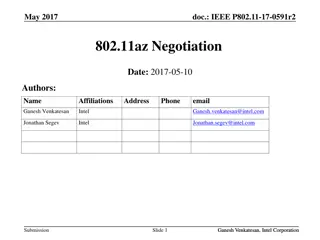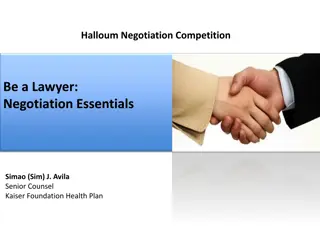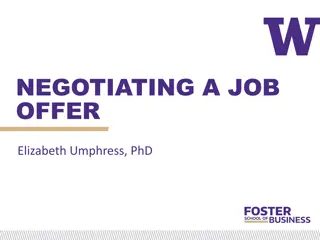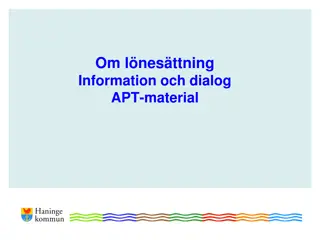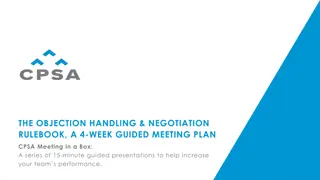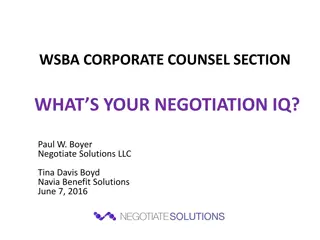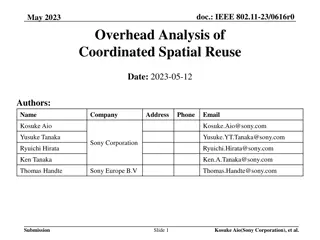Negotiation and Sale Agreement Essentials
Seller and buyer negotiations involve considerations such as representations, warranties, due diligence, financing options, concessions, and alternatives to achieve a successful sale. Key factors include seller and buyer desires, access to information, risk management, payment terms, and formalizing agreements in writing.
Download Presentation

Please find below an Image/Link to download the presentation.
The content on the website is provided AS IS for your information and personal use only. It may not be sold, licensed, or shared on other websites without obtaining consent from the author. Download presentation by click this link. If you encounter any issues during the download, it is possible that the publisher has removed the file from their server.
E N D
Presentation Transcript
NEGOTIATION PHASE Seller Wants Buyer Wants Representations that provide to the best of Seller s knowledge , warranties that are triggered by materiality, or no warranties or representation. Seller s representations as to all material items: Authorization, Title to Assets, Financial Statements Accurate, No Litigations. Seller wants to hold the Buyer accountable for closing. Buyer wants Seller s representations to survive closing. Seller wants the entire purchase price at closing. Seller must know what Seller wants and what Seller Needs. As counsel to the Seller determine what is important to Seller. Minimal Buyer representations Buyer wants to be able to walk away from the transaction for any reason. Non-refundable Deposit. Refundable Deposit.
NEGOTIATION PHASE Seller Wants Buyer Wants Short due diligence period. Significant time to complete due diligence. Seller wants Buyer limited access to Seller s employees to limit knowledge of sale Access to employees, books and records. Escrow or hold back of some portion of the purchase price to protect against inaccurate representations by Seller. Seller wants to pay capital gain vs ordinary income. Seller wants recourse against Buyer if Buyer does not pay. Buyer wants to depreciate assets. Buyer wants no competition.
NEGOTIATION PHRASE Seller Buyer Consider Concessions Consider Alternatives to Make the Sale Close Funding Shorter payment term Cash better for Seller no risk that Buyer won t pay but hard to find a cash buyer Increase purchase price Provide larger down payment Bank Financing may result in delays Allow Seller to retain assets Seller Financing - seller holds the risk Offer employment to Seller, or continuation of benefits Earn Outs- payment of the purchase price based on meeting certain goals. (example based on number of clients retained) Seller remains involved in business. Extend Lease if benefits Seller Know what the Seller wants and why Stock in the new business
NEGOTIATION PHRASE Seller Buyer Consider Concessions Alternatives to Get to Closing Employment in lieu of Money Continuation of Benefits Meet with advisors to understand the tax ramifications, accounting issues, and legal issues. Flexible Terms for payment interest only, refinance after a period of time.
NEGOTIATION PHASE All Terms that have been agreed to need to be formalized into a Writing.
PURCHASE AND SALE AGREEMENT Purchase and Sale Provisions Parties Assets: Locations of the Businesses Cash on Hand Inventory Assets complete list of assets included and excluded Client List What liabilities are included Goodwill Purchase Price Accounts Receivables Fixed Assets Adjustments to Purchase Price Contracts WIP Allocation of Purchase Price among the assets Domain Names Trademarks and Tradenames
PURCHASE AND SALE AGREEMENT Purchase Price Adjustments Reflect the change in the Purchase Price that occur between the signing of the Agreement and Closing. Typical adjustments are made for: Inventory Accounts Receivables Work in Progress The Agreement could provide for adjustments if material.
PURCHASE AND SALE AGREEMENT Allocation of Purchase Price Cash seller typically retains Allocation of Purchase Price: IRS Form 8594 attach to tax filing of Seller and Buyer Securities seller typically retains Different Assets have different tax consequences Accounts Receivable Ordinary Income Inventory Ordinary Income Fixed Assets Deprecation Recapture - Ordinary Income Intangibles non-competes, trademarks, trade names - CG Goodwill taxed as capital gain (15 years) Consulting Agreement - Ordinary Income
PURCHASE AND SALE AGREEMENT Allocation of Purchase Price Depreciation Recapture on Fixed Assets: Capital Gains Tax Rates 15 to 20% Originally Purchased Asset for $500,000 Deprecation of $400,000 Ordinary Income Tax Rates 10% to 37% Book Value $100,000 22% rates for singles start at income of $85,000+ Price Allocated to the Asset = $350,000 22% rates for married start at $80,000+ Depreciation Recapture = $250,000
PURCHASE AND SALE AGREEMENT Purchase Agreement Provisions Payment Terms Note Third Party Financing Seller Financing Cash Earn Outs Seller gets a portion of the Income after the business is sold
PURCHASE AND SALE AGREEMENT Purchase Agreement Terms Purchase Agreement Terms Security for Payment of the Purchase Price Other Agreements Among the Parties Security Agreements Non-Compete Deed of Trust Non-Solicitation UCC Filings Non-Disclosure/Confidentiality Possession Consulting Agreement Personal Guaranty Employment Agreement Subordination Agreement Lease Agreement Franchise Agreement Assignment and Assumption Contracts
NON COMPETE STATUTE Idaho Code 44-2704 44-2704. RESTRICTION OF DIRECT COMPETITION REBUTTABLE PRESUMPTIONS.(1) Under no circumstances shall a provision of such agreement or covenant, as set forth herein, establish a postemployment restriction of direct competition that exceeds a period of eighteen (18) months from the time of the key employee s or key independent contractor s termination unless consideration, in addition to employment or continued employment, is given to a key employee or key independent contractor. Nothing in this chapter shall be construed to limit a party s ability to otherwise protect trade secrets or other information deemed proprietary or confidential.(2) It shall be a rebuttable presumption that an agreement or covenant with a postemployment term of eighteen (18) months or less is reasonable as to duration.(3) It shall be a rebuttable presumption that an agreement or covenant is reasonable as to geographic area if it is restricted to the geographic areas in which the key employee or key independent contractor provided services or had a significant presence or influence.(4) It shall be a rebuttable presumption that an agreement or covenant is reasonable as to type of employment or line of business if it is limited to the type of employment or line of business conducted by the key employee or key independent contractor, as defined in section 44-2702, Idaho Code, while working for the employer.(5) It shall be a rebuttable presumption that an employee or independent contractor who is among the highest paid five percent (5%) of the employer s employees or independent contractors is a "key employee" or a "key independent contractor." To rebut such presumption, an employee or independent contractor must show that it has no ability to adversely affect the employer s legitimate business interests.
PURCHASE AND SALE AGREEMENT - PROVISIONS Seller s Representations Seller s Representations Existence of Entity, Authority to enter into Agreement, and ownership of entity. No material change in the business operations since the agreement is signed to closing. All taxes have been filed and paid Financial Statements are accurate No litigation pending or threatened Title and Condition of Assets are good and marketable No labor issues No violation of franchise agreement or other agreements. No adverse consequences which would prevent consummation of transaction.
PURCHASE AND SALE AGREEMENT - PROVISIONS Buyer s Representations Existence of Entity, Authority to enter into Agreement, and ownership of entity. No Conflict or Authorization need to close Sufficiency of Funds Solvent Independent Investigation of Assets, Financials etc.
PURCHASE AND SALE AGREEMENT - PROVISIONS Covenants Indemnifications Seller Indemnifies Buyer for Damages resulting from misrepresentation and 3rd party claims arising before sale Further Assurances as to other documents Payment of Accounts Payable Before and After Closing. Promise to operate the Business in the same manner after signing of the Agreement Buyer indemnifies for Damages resulting from misrepresentations and 3rd party claims arising after the sale Not market business for sale Cooperate with the Due Diligence requests Cooperate to get 3rd party consents Promise to not disclose Limits on ability to indemnification to damages are in excess of $_________.
PURCHASE AND SALE AGREEMENT - PROVISIONS Transition Procedure Transfer of Work in Progress Collection of Receivables How to handle issues Inventory lower than promised Litigation that arises after sale Contingencies to Proceeding Review of Financial Statements Transfer/Assignment of Lease Transfer/Assignment of Business Name Funding Ready Each party performs their obligations and delivers what is required Receipt of Deposit
PURCHASE AND SALE AGREEMENT Additional Provisions Conditions to Closing Default Provisions What would prevent either party closing Legal and Financial Consequences Death, issues with bank financing, Pandemic, Tariffs, etc. Damages: Closing Obligations Monetary Specific Performance Buyer s right to reduce purchase price for asset value variations or liabilities incurred Restitution Seller s right to financials of Buyer until purchase price paid in full. Exhibits with transfer documents attached Brokerage Fees/And Responsibility for Fees
PURCHASE AND SALE AGREEMENT Drafting the Agreement Typically one party will draft the agreement and submit a copy to the other party for review and provide comments. Comments are provided in redline so they are easily reviewed. Keep track of iterations by tracking version
PURCHASE AND SALE AGREEMENT Drafting the Agreement Schedules Prepare and Collect Schedules Consents of Co-owners Consent of Landlord if Lease being assigned List of Accounts Receivable Inventory List Asset List, including accounts receivable list
PURCHASE AND SALE AGREEMENT Drafting the Agreement Make sure each of the separate agreements are reviewed and ensure it is a binding agreement, and the appropriate party has authority to sign. Schedules Lease Agreement Assumption of Contract Promissory Note, including Personal Guaranty Security Agreement Funding Letter Loan Agreements Bill of Sale Transfer documents for other assets
PRE CLOSING CHECKLIST SEE DUE DILIGENCE CHECKLIST Go through list to ensure that each of the items have been reviewed. Real Property Title Policy Will show owner of property Legal description Exceptions, liens, encumbrances Review Zoning Restrictions if Any Personal Property UCC Search
PRE CLOSING CHECKLIST If representing the Buyer, ensure r there has been no material changes in: Seller s representations Assets of the Business or Business operations Financial Statements Funding Review title policy to resolve with any encumbrance issues If liens are to be paid off at closing, make sure closing agent has the necessary information to pay lien at closing to avoid delays
PRE CLOSING CHECKLIST Schedule the Closing Date Prepare or review the escrow closing instructions Ensure consent of owners to proceed to sale are signed Final Review of all documents to be signed Review allocation agreement to be filed with tax return (Form 8594) Obtain Sales Tax Clearance Letter Prepare Dissolution Documents With Sec. of State
CLOSING Closing Documents Review purchase and sale agreement for deliveries at Closing Stock Certificates Non Compete Agreement Consulting Agreements Personal Guarantee Assignments Consents: 3rd Party, Board, Owners, Landlord, Regulatory Agency Deeds UCCs Promissory Note Security Agreements Resignations of Officers and/or Directors Contracts, Leases, Trademarks, and other IP Titles to Vehicles Purchase Price Promissory Note and/or cash
POST CLOSING File UCC with secretary of state File Deed with County if real estate involved Update filings with Secretary of State if needed Prepare Dissolution Documents With Sec. of State if entity is being dissolved Change title to vehicles Update formation documents if needed File final employment returns if Seller File final sales tax returns if Seller Make a list of all documents that will need to filed after closing, such as change of registered agent, etc.
ATTORNEY CONCERNS Claims Against Attorney Inadequate representation Not following through Conflict of Interest Conflict Waivers Breach of Fiduciary Duty Scriveners Error







